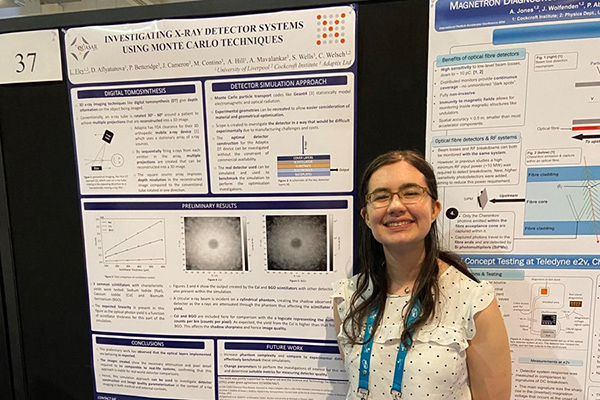LIV.INNO at IPAC

The University of Liverpool’s STFC-funded Liverpool Centre for Doctoral Training for Innovation in Data Intensive Science (LIV.INNO), was showcased at this year’s International Particle Accelerator Conference (IPAC’24). An international event that attracts more than 1,200 attendees, the conference is an opportunity to present and discuss advances in all areas of particle accelerator science with leading experts in the field. IPAC’24 was hosted in Nashville, Tennessee and ran from 19th – 24th May.
The LIV.INNO CDT saw multiple avenues of representation including a poster and paper about the CDT presented by Professor Carsten Welsch, a spotlight on the University of Liverpool exhibitor stand and the presentation of research by Lauryn Eley, a 2nd year PhD student on the CDT.
LIV.INNO highly featured at the University of Liverpool’s exhibition stand as part of the industry exhibition. Constantinos Astreos and Minh Cao represented the university and distributed latest news on large-scales projects including LIV.INNO, the MSCA Doctoral Network EuPRAXIA-DN as well as the R&D carried out within the QUASAR Group.
Lauryn created a paper and poster for this conference focussed on her current research, both titled ‘Investigating X-ray detector systems using Monte Carlo Techniques’. This contribution explored her use of Geant4, which uses Monte Carlo statistics to model particle interaction with matter, to simulate a detector system to investigate what the optimal detector would look like for X-ray imaging. The investigation is specifically concentrated on digital tomosynthesis: a 3D X-ray imaging modality used by Adaptix Ltd, the industry partner on this project, as outlined in greater detail within the associated proceeding.
In general, there was a very strong focus on data science applied over a range of topics at IPAC’24. A large number of discussions taking place centred around machine learning, optimisation, AI and other related subjects. This provided a unique opportunity to discuss this work with experts using particle accelerator techniques and data analysis methods for similar medical physics applications, particularly within the poster session. With the range of techniques presented by the other attendees, the scope of discussion possible proved informative in creating new perspectives.
Lauryn’s paper, as well as Prof. Welsch’s and other data science relevant proceedings are available from the IPAC’24 pre-proceedings at https://www.jacow.org/ipac2024/ . The full official proceedings will follow these soon.